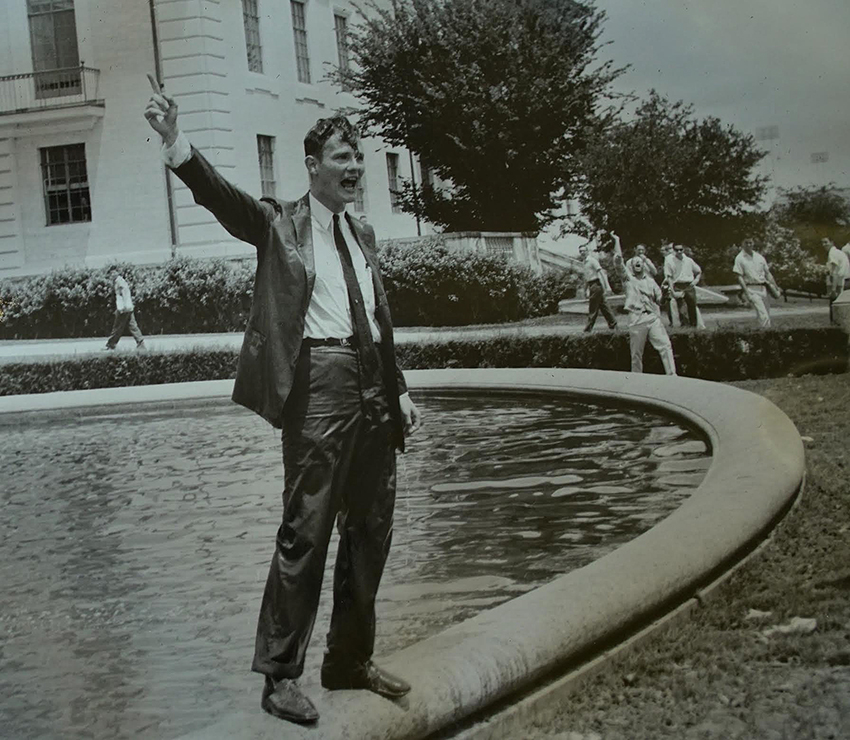As the first openly gay man to talk about homosexuality on the radio and the organizer of the first gay-rights demonstration protesting the treatment of LGBTQ in the military, Randy Wicker found himself at the crux of the 1960’s gay-rights movement. Despite his critical role in bringing mainstream attention, he was ultimately cast out as a radical.
It all started for Wicker during his junior year at UT in 1958. He first became politically active by affiliating himself with the Young Democrats and riling up media attention by calling upon then-Sen. Lyndon B. Johnson to show editorial support for civil rights in Texas. The next year, Wicker ran for student body president on a platform of integration, free tuition and state congressional lobbying for students.
“I organized a march on the (state) capitol to protest a bill proposing to raise in-state tuition from $50 to $100,” Wicker said. “The march started on University Avenue, and suddenly, a group of frat-rats opposing me in the election picked me up and threw me in Littlefield Fountain.”
Wicker’s rebel-rousing made him a dorm-hold name on campus, frequently finding himself on the front page of The Daily Texan.
According to a Texas Ranger article published in 1960, “(Wicker) created a publicity success out of a dismal failure.”
According to Wicker, he was called into the dean’s office and told if he was found to be homosexual, he could not be student body president. Wicker believed a fellow student had disclosed information about Wicker’s sexuality to a school counselor who relayed the information up to the dean.
“Back then, if you were found to be a homosexual, you would be given the option of dropping out of school without anything on your record, or you would be kicked out,” Wicker said. “We were considered criminals, we were considered sick, we were caricatured — the idea of gay marriage wasn’t even on our radar.”
Wicker never had to face these consequences but ultimately lost the election. After graduating, Wicker moved to New York City, soon becoming one of the most vocal and visible gay-rights activists. However, in the wake of the Stonewall riots, Wicker was deemed too radical by many gay-rights groups, including the Mattachine Society, and Wicker became less directly involved in the movement.
“He was, let’s say, a disturbing acquisition for the movement,” said Arthur Maule, then-president of the Mattachine Society, in John Loughery’s 1998 book “The Other Side of Silence.”
Randy Wicker continues to advocate for gay and civil rights, most recently associating himself with the Radical Faeries movement and promoting the documentary “The Death and Life of Marsha P. Johnson,” which premiered at Tribeca Film Festival.
“One day, my roommate asked if one of his friends could crash at our apartment,” Wicker said. “That was how I came to meet Marsha P. Johnson, and she became my roommate for the next 12 years.”
Marsha P. Johnson, an outspoken transsexual, co-founded the Street Transvestite Action Revolutionaries, modeled for Andy Warhol and was a prominent figure in the Stonewall riots. Her unexpected alleged suicide in 1992 came as a shock to the LGBTQ community, many of whom believe she was murdered.
“The Death and Life of Marsha P. Johnson,” directed by Academy Award nominee David France, recently showed at Austin Gay and Lesbian International Film Festival on Sept. 9 and is headed to Netflix on Oct. 6. Wicker, who visited Austin to promote the film, revisited the 40 Acres, where he stumbled upon a LGBTQ group and gave an impromptu speech.
“I said, ‘When I joined the movement in 1958, there were not as many activist(s) in what is now the LGBTQ movement,’” Wicker said. “‘The future is yours, and I know you will continue the work we started in the 1950s. You will make the world a better place for the generation that comes after you, the way we left the world a better place for you.’ I came here to resolve my unfinished business on this campus, and in a way, I did.”





















